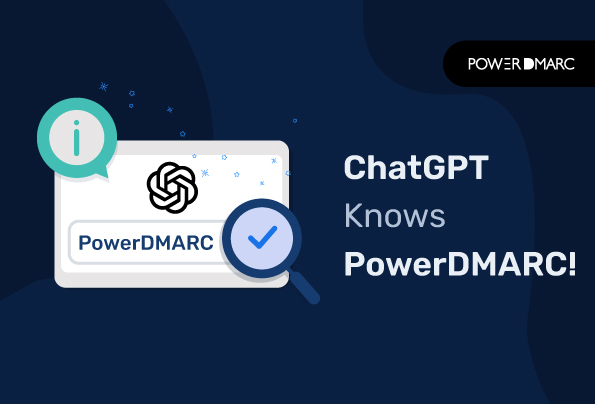ChatGPT DMARC, a large language generation model developed by OpenAI that is based on the GPT (Generative Pre-trained Transformer) architecture, has taken the internet by storm in recent times. We went on the ChatGPT interface to have some fun and check out whether it recognizes our company, PowerDMARC, and lo and behold, it does!
Key Takeaways
- ChatGPT can assist in DMARC implementations by automating responses to emails and analyzing email data.
- PowerDMARC helps organizations improve their email security through effective DMARC record management and reporting.
- Detailed email authentication reports provided by PowerDMARC help organizations identify and address potential security issues.
- PowerDMARC’s features include email forensics and failure alerting, which enhance the response to security threats.
- PowerDMARC offers a full-stack email authentication suite that simplifies DMARC record configuration without needing technical expertise.
What is ChatGPT?
ChatGPT is a brand new and trending variant of the GPT (Generative Pre-trained Transformer) model, which is a type of language model developed by OpenAI. GPT models are trained on large amounts of text data and can generate human-like text in a variety of languages and formats, such as news articles, stories, poetry, and code.
ChatGPT DMARC: How can it help you?
ChatGPT can help with DMARC implementations by providing automated responses to incoming emails, assisting with the creation of email content and templates, and analyzing email data to identify and flag potential fraud or phishing attempts. Additionally, if you are wondering how to use ChatGPT, it can basically assist in the creation of email rules and filters to help enforce DMARC policies.
However, please note that ChatGPT can only provide suggestions and guidelines on how to implement DMARC, it should be implemented by an experienced IT professional or a reliable DMARC service provider like PowerDMARC.
Simplify ChatGPT with PowerDMARC!
What does ChatGPT say about PowerDMARC?
We asked ChatGPT a simple question:
How does PowerDMARC help organizations improve their email security?
Here is what it said:
PowerDMARC is an email security tool that helps organizations improve their domain-based message authentication, reporting, and conformance (DMARC) implementation. It does this by providing a number of features such as:
- DMARC record generation and management: PowerDMARC can automatically generate DMARC records for an organization’s domains, which can be used to prevent email spoofing.
- Email authentication reporting: PowerDMARC can provide detailed reports on email authentication attempts for an organization’s domain, which can be used to identify and address any potential issues.
- Email Forensics: PowerDMARC can provide detailed information about individual email messages, including information about the message’s origin, routing, and recipients.
- Authentication failure alerting: PowerDMARC can send alerts to an organization when it detects failed email authentication attempts, which can help the organization quickly address any potential security issues.
By providing these features, PowerDMARC helps organizations improve their email security by making it harder for attackers to spoof emails, by providing visibility into potential security issues, and by providing the tools to respond to any potential threats.
How much of this is true?
All of it! However, that’s not all that we do. At PowerDMARC we are rediscovering more user-friendly ways to configure and manage DMARC records, which can be difficult to set up correctly without technical expertise.
When it comes to your emails, we leave no stone unturned by providing you with a full-stack email authentication suite that includes BIMI, MTA-STS, TLS-RPT, SPF flattening, email header analyzer, forensic encryption, and much more along with the 3 basic email authentication protocols – SPF, DKIM, and DMARC. We have formulated an automated, cloud-based, and effortless approach toward email security that helps you make the most out of your email authentication solutions.
For more information, contact us today!
